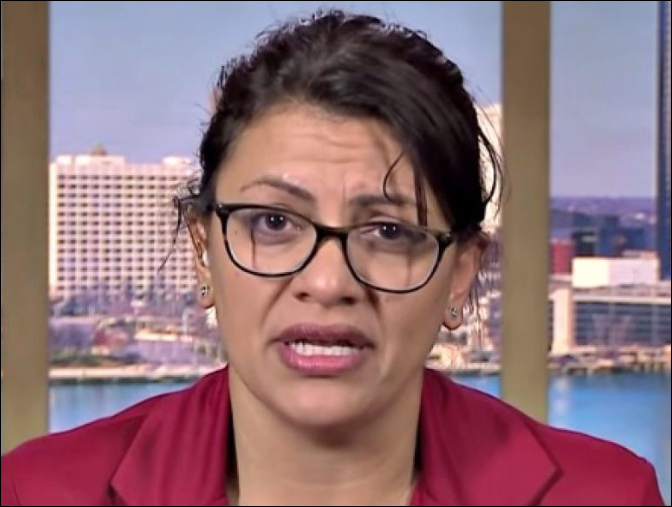Throughout her 2018 campaign for Congress, Michigan Rep. Rashida Tlaib repeatedly begged for cash from her campaign for personal expenses and “may have violated House rules, standards of conduct, and federal law,” according to the Office of Congressional Ethics.
 The House Ethics Committee investigating Tlaib’s potential 2018 campaign violations released documents Thursday that included text messages between the Socialist congresswoman and campaign staff that earned a referral from the OCE.
The House Ethics Committee investigating Tlaib’s potential 2018 campaign violations released documents Thursday that included text messages between the Socialist congresswoman and campaign staff that earned a referral from the OCE.
The Ethics Committee has now “expanded” the investigation into Tlaib’s campaign finances, Fox News reports.
It all started in April 2018, when Tlaib began complaining to her staff in emails about “struggling financially right now.”
She said she was “sinking.”
“So I was thinking the campaign could loan me money, but Ryan said that the committee could actually pay me,” Tlaib wrote in emails released by the OCE. “I was thinking a one time payment of $5k.”
Days later, she apparently had a better idea.
“I am just not going to make it through the campaign without a stipend,” she wrote.
“With the loss of a second income to lean back on,” Tlaib wrote. “I am requesting $2,000 per two weeks but not exceeding $12,000. The cost of living stipend is going towards much needed expenses due to campaigning that includes car maintenance, child care and other necessities. Please let me know if I can proceed.”
The bottom line: Tlaib collected a lot of cash from her campaign until and beyond the general election, which could be a problem, according to the OCE.
If Tlaib “converted campaign funds from Rashida Tlaib for Congress to personal use, or if Tlaib’s campaign committee expended funds that were not attributable to bona fide campaign or political purposes, then Tlaib may have violated House rules, standards of conduct, and federal law,” according to an OEC release.
“The Board recommends that the Committee further review the above allegation concerning Rep. Tlaib because there is substantial reason to believe that Rep. Tlaib converted campaign funds from Rashida Tlaib for Congress to personal use or Rep. Tlaib’s campaign committee expended funds that were not attributable to bona fide campaign or political purposes.”
Federal law allows candidates to pay themselves a salary through campaign contributions if it doesn’t exceed their previous year’s salary.
According to the Detroit Free Press:
Tlaib, D-Detroit, a civic rights activist, lawyer and divorced mother of two children, stopped working to run for Congress last year and, after consulting with lawyers and campaign staff, began collecting a salary in May of last year, receiving $28,000 between then and Nov. 1.
But federal law requires that payments for work after the candidate wins or loses an election cease and a report from the independent Office of Congressional Ethics (OCE) to the Ethics Committee questions whether the last two payments – the first on Nov. 16 and the second on Dec. 1 – violated that rule.
The last two payments totaled $17,500, the news site reports.
Tlaib’s lawyers responded to the OCE’s report by asserting that the scheme is entirely legal, and Tlaib could have collected a lot more because she made a lot of money.
“In 2017, the year prior to becoming a candidate, she received earned income totaling $129,357, or $44,643 less than a freshman Member of Congress. Her income during the campaign was well below this level,” her attorneys wrote. “While she was permitted to earn salary payments of nearly $5,000 per two-week period based on her previous income, she was never paid more than 60 percent of this – well below the candidate salary limit.”
The attorneys allege the two payments after the general election were for work before the general election, so technically that’s fine.
Tlaib gave the Ethics Committee payment records and offered to submit statements to the OCE through lawyers, who took issue with the OCE’s claims that Tlaib’s staff “refused to cooperate” with the review.
The OCE “fails to disclose that Representative Tlaib produced every document included among its findings; that she raised jurisdictional and prudential objections that it disregarded; and that her counsel offered to submit interrogatory questions to be answered by the Congresswoman and her staff under penalty of perjury … as an alternative to the burden and significant expense of interviews, which OCE declined.”
In summary, Tlaib collected thousands from her campaign while running for Congress in 2018, a gravy train that continued after she was elected, but her lawyers argue it’s legal and above board, so the OCE and Ethics Committee should just dismiss the investigation.
Tlaib, meanwhile, is spinning the situation into a tale of how “FEC innovations that level the playing field” are helping folks without “financial privilege” to run for office.
“During the campaign, I received the minimum salary payments necessary for me to meet my personal financial obligations, while ensuring that the campaign reserved the resources needed to reach voters,” she told the Free Press. “All in all, I was paid less than I was entitled to receive under FEC regulations.”
“I hope my experience will clear more room for people like me to run for office by availing themselves of FEC innovations that level the playing field, like paying a non-incumbent candidate salary or covering childcare expenses with campaign funds, so that financial privilege is not a prerequisite to participate in our democracy.”
Leave a Comment
COMMENTS POLICY: We have no tolerance for messages of violence, racism, vulgarity, obscenity or other such discourteous behavior. Thank you for contributing to a respectful and useful online dialogue.